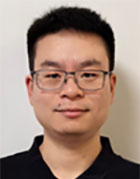Jul
11

Date: 11 July 2024
Time: 10:00 AM ET (New York Time)
Presenter(s): Dr. Pier Luigi Dragotti, Dr. Jun-Jie Huang
Based on the IEEE Xplore® article:
"WINNet: Wavelet-Inspired Invertible Network for Image Denoising", published in the IEEE Transactions on Image Processing, June 2022.
Original article: Download article
Original article is open access and publicly available to all for download.
Abstract
Invertible Neural Networks (INNs) are a class of deep networks that approximate bijective functions and are characterized by a forward mapping that can be inverted. Initially they were introduced as generative models, where the INNs learn a transformation between the input data distribution and a simple prior distribution (typically a normal distribution). The inverse mapping then automatically acts as a generator, converting the simple distribution into samples resembling the input data. More recently, INNs have also been employed to solve inverse problems.
In this talk, the presenters argue that INNs are powerful systems applicable in a variety of fields. Their success stems from the fact that they can be designed by combining model-based methods with data-driven approaches. First, the presenters explore the interplay between wavelet theory and INNs. Using the lifting scheme, they design a wavelet-inspired INN (WINNet) and focus on the image denoising task. WINNet achieves state-of-the-art performance in image denoising and generalizes well to images with unseen noise levels. Additionally, they demonstrate that WINNet can be used as regularizer in other image restoration tasks.
Next, they will introduce INDigo, a novel INN-guided probabilistic diffusion algorithm for arbitrary image restoration tasks. INDigo combines the perfect reconstruction property of INNs with the strong generative capabilities of pre-trained diffusion models. Specifically, they leverage the invertibility of the networks to condition the diffusion process and in this way generate high quality restored images consistent with the measurements.
Finally, to further showcase the capabilities of INNs, they present additional applications where INNs have had a significant impact, including image reflection removal and image steganography.
Biography

Pier Luigi Dragotti (F’17) received the Masters Degree (summa cum laude) from the University Federico II, Naples, Italy, in 1997 and the Ph.D. degree from the Swiss Federal Institute of Technology of Lausanne (EPFL), Switzerland in 2002.
He is Professor of Signal Processing in the Electrical and Electronic Engineering Department at Imperial College London and a Fellow of the IEEE. He has held several visiting positions. In particular, he was a visiting student at Stanford University, Stanford, CA in 1996, a summer researcher in the Mathematics of Communications Department at Bell Labs, Lucent Technologies, Murray Hill, NJ in 2000, a visiting scientist at Massachusetts Institute of Technology (MIT) in 2011. His research interests include sampling theory and its applications, computational imaging and model-based machine learning.
Dr. Dragotti was Editor-in-Chief of the IEEE Transactions on Signal Processing (2018-2020), Technical Co-Chair for the European Signal Processing Conference in 2012 and Associate Editor of the IEEE Transactions on Image Processing from 2006 to 2009. He was a SPS Distinguished Lecturer in 2021-22. He was also an Elected Member of the IEEE Image, Video and Multidimensional Signal Processing Technical Committee, IEEE Signal Processing Theory and Methods Technical Committee and of the IEEE Computational Imaging Technical Committee. In 2011 he was awarded the prestigious ERC starting investigator award (consolidator stream).

Jun-Jie Huang received the B.Eng. degree (Hons.) in electronic engineering and the M.Phil. degree in electronic and information engineering from The Hong Kong Polytechnic University, Hong Kong, China, in 2013 and 2015, respectively, and the Ph.D. degree from Imperial College London (ICL), London, U.K., in 2019. From 2019 to 2021, he was a Post-Doctoral Researcher with the Communications and Signal Processing (CSP) Group, Electrical and Electronic Engineering Department, ICL.
He is now an Associate Professor with the College of Computer Science and Technology, National University of Defense Technology (NUDT), Changsha, China. His research interests include model-based deep learning, computer vision, and signal processing.
